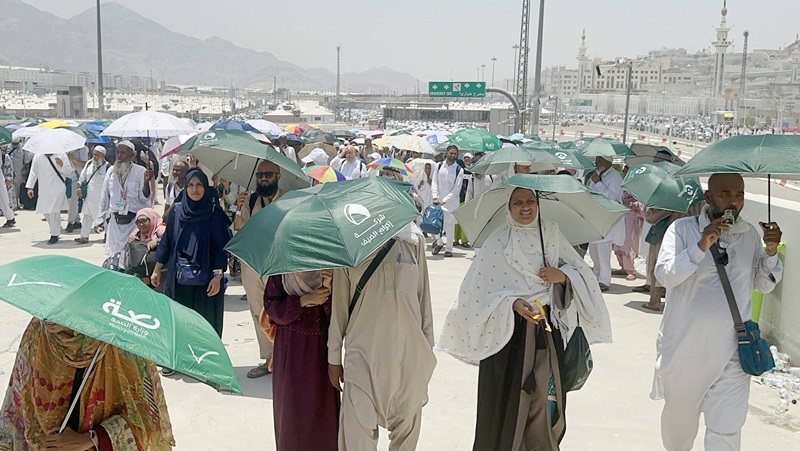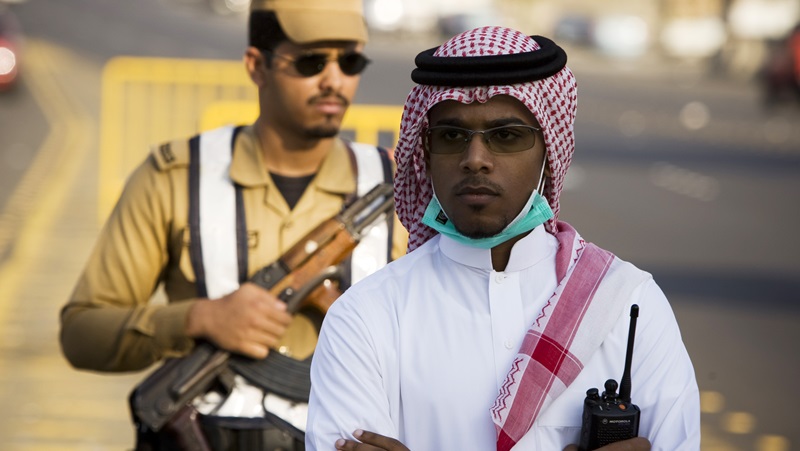A Saudi visa crackdown left Hajj pilgrims feeling unable to ask for help in a killer heatwave, survivors and the families of the dead told Climate Home.
For the first time this year, Saudi authorities required all pilgrims to wear identification on a “Nusuk Card” around their neck, allowing security forces to check they had the Hajj visa. Banners and phone messages warned against attending Hajj without this visa and many breaching these rules were deported.
A government-controlled Youtube channel said before the Hajj that the Nusuk Card “enables access to urgent medical care” and one survivor told Climate Home that, despite feeling tired and dizzy, he felt unable to ask for medical help for fear of punishment and deportation because he only had a tourist visa.
Temperatures in Mecca reached 51.8C this year, an unusually high figure which Climatemeter scientists have said was “mostly exacerbated by human-driven climate change”.
Over 1,300 people died during the heatwave and more than four-fifths of them were without official permits, according to Saudi Health Minister Fahad Al-Jalajel. Foreign governments have largely blamed travel agents for facilitating these irregular pilgrimages, while the Saudi authorities and climate change have mostly escaped blame.
One of those without a permit was Ibrahim, a retired Egyptian head teacher. To dodge visa checks, he walked 19 km in the baking heat to Arafat, a sacred hill near Mecca. He told Climate Home that he had asked buses carrying pilgrims with permits to stop and take him “but no one stopped, no one helped us”.
#No_Hajj_without_a_permit because services are directly linked to it, and accessing the Holy Sites without a permit is a violation that merits legal consequences.#Makkah_and_Madinah_Eagerly_Await_You#No_Hajj_without_a_permit#Hajj_1445H pic.twitter.com/aapODeC018
— Ministry of Hajj and Umrah (@MoHU_En) May 22, 2024
Fahad Saeed, a Pakistani climate scientist with Climate Analytics, told Climate Home: “The Hajj pilgrimage is a profound reminder to every Muslim of equality in the eyes of God. Yet, the disparity in the safety of pilgrims based on their financial means starkly contradicts this spirit of equality.”
Two-tier system
The city of Mecca is where the founder of Islam, the Prophet Muhammad, was born and lived most of his life. One of the religion’s five central pillars is that all believers should, if they’re healthy and can afford it, visit the city at least once on a pilgrimage known as Hajj and carry out a series of rituals.
Since Muhammad’s time, Islam has expanded across the globe and is now the religion of about a quarter of the world’s people. As the Hajj takes place for a single five-day period each year, there are far more people wanting to take part than the city can handle. Over 1.5 million pilgrims arrived in Mecca for the event last June.
Beyond lithium: how a Swedish battery company wants to power Europe’s green transition with salt
Official visas to enter Mecca during the Hajj are rationed through a lottery system, working with specialist travel agencies. But some travel agents also advise pilgrims on how to enter Mecca without an official visa.
That was how Ibrahim, who had been saving up for the Hajj for thirty years, got to Mecca. He did not want to reveal his second name out of fear of the Saudi government’s punishment.
He told Climate Home that he couldn’t afford an official visa 500,000EGP ($10,000). He entered Saudi Arabia with a normal tourist one and, with the help of a tourism company, he was able to bribe his way through checkpoints into Mecca.
He found accommodation in the suburb of Al-Aziziyah but authorities quickly raided the area before the start of Hajj. Many pilgrims without official visas were fingerprinted and deported but Ibrahim was just driven out of the city towards Jeddah.
For 1,000 Riyals ($267), he found a taxi to take him back to Al-Aziziya where he hid until the first day of Hajj. This is the pilgrimage’s most important day when pilgrims spend a day next to Mount Arafat, where Prophet Muhammad delivered his Farewell Sermon. There, they pray and ask for forgiveness.
Most pilgrims get buses from Mecca to Arafat but, worried about soldiers searching these buses, Ibrahim and his companions made the 19 km journey on foot. When he got there, the area was crowded and the temperature reached nearly 50C (122F).
The 62-year old said he began to feel exhausted and dizzy even though he was not fasting that day. “My foot, which had undergone three surgeries before, felt like a piece of fire. I could not walk”, he said.
Standing up in the heat lessens the blood flow to the brain, which can cause fainting but also heart or kidney failures, explained Mike Tipton, a British professor who advises athletes and soldiers on heat.

Muslim worshippers make their way to cast stones as part of a symbolic stoning of the devil ritual on June 18, 2023. (Photo: Medhat Hajjaj/apaimages)
Ibrahim said that getting water for him was difficult and that he did not want to ask the clinics along the road to Arafat for medical help because of his lack of visa. “We saw the bodies of pilgrims on the road in need of help,” he said, “some of them were dead, some were suffering from heat exhaustion and no one was helping them”.
The claim that irregular pilgrims were denied help has been made by many, including the official spokesperson for pilgrims from Iraq’s autonomous Kurdistan region Karwan Stoni, who told Agence France Presse they could not access air-conditioned spaces that the authorities had made available.
Ibrahim survived, completed his Hajj and returned to Egypt. But Jordanian cousins Tariq, 48, and Hossam Al-Bustanji, 52, were not so lucky. Their cousin Ahmed told Climate Home that their companions told him they died after walking about for seven or eight hours without any services.
“They fell and pleaded for water but no one helped them”, he said. “Their bodies were buried in Mecca and were not sent to Jordan despite our requests”.

Pilgrims receive a spray of water from volunteers in Mecca on June 17, 2024 (Photo: Arab World Press)
While irregular pilgrims had it worse, even those with official visas suffered and some died in the heat. Jordanian Rania Bassam told Climate Home her brother and his family went to Mecca, where he volunteered as a doctor.
She said they complained to her about the services provided and the extreme heat. Bassam’s brother later died in Arafat. “His body was identified by his fingerprint but we were prevented from seeing him and saying goodbye”, she said.
Tipton said that, while many of the dead were likely to be over 65-years old with existing heart problems, the heat can kill healthy young people too from heat stroke.
Without getting bodies into cold water, heat stroke can be a “runaway route to hypothermia with death occurring at [a core temperature of] 40-44C”.
Safer Hajj
Campaigners are appealing to Saudi authorities to take measures that would reduce the risk of mass deaths, especially as the situation is expected to get worse as the world warms.
A 2021 study published in Environmental Research Letters found that if the world warms by 1.5 C above pre-industrial levels, heat stroke risk for pilgrims on the Hajj will be five times greater.
Heat expert Mike Tipton said that they should encourage people to sit down when they can, reduce any stress, fan people and cool their hands, feet and bodies down with cold water. But, he said, it’s difficult to look after so many people.
Sign up to get our weekly newsletter straight to your inbox, plus breaking news, investigations and extra bulletins from key events
Limiting numbers would help, he said, and that’s the route the authorities have been going down. Government reactions in Saudi Arabia and across the Muslim world have been to prosecute and crack down on travel agents who encourage pilgrims to evade visa laws.
But that has not been enough to dissuade Ibrahim’s wife. Despite her husband’s ordeals, she is keen to follow in his footsteps next year, performing Hajj unofficially.
But speaking in their Giza home, Ibrahim warned her against the idea. “You will not be alive again if you go unofficially – either you go on an official Hajj or not at all”, he said.
(Reporting by Eman Muhammed and Joe Lo, editing by Joe Lo and Matteo Civillini)
